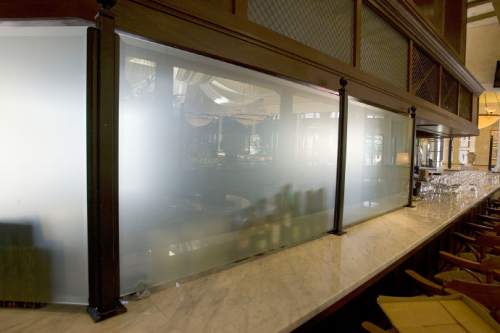This is an archived article that was published on sltrib.com in 2016, and information in the article may be outdated. It is provided only for personal research purposes and may not be reprinted.
A law that requires new Utah restaurants to build 7-foot barriers — known as Zion Curtains — likely will remain on the books for at least another year.
On Tuesday, members of the Senate Business and Labor Committee decided it was better to spend the next year studying Utah's sometimes "weird" liquor laws, rather than making piecemeal changes.
"It's time to have some good discussion on our alcohol laws," Sen. Gene Davis, D-Salt Lake City, said after hearing testimony on SB141. The bill, sponsored by Sen. Jim Dabakis, D-Salt Lake City, would have done away with the barriers that new restaurants must build to shield patrons from bar areas, a law designed to prevent minors from seeing alcoholic drinks being poured.
The walls are "ugly, miserable and create a weirdness factor," Dabakis said. "Utah looks weird."
The committee also was expected to consider two other bills, proposed by Sen. Karen Mayne, D-West Valley City, that would affect funding and operations at the Utah Department of Alcoholic Beverage Control (DABC.) After a committee discussion, however, Mayne conceded that the bills "should be taken to interim for full study."
In recent months, Mayne has blasted DABC for mistreating workers, resulting in dismal morale. Her proposal would mandate that 13 percent of the revenues from liquor sales in the state go back into operating the DABC rather than being pumped back into the state budget. It also would require each store to have one manager and half the employees in each store to be full-time workers and to give the workers a 10 percent raise.
The second bill would have created a "facilitator" position in the department to act as a sort of ombudsman, helping resolve problems raised by licensees, distributors, employees and customers.
All those proposals will now be discussed during the year for possible consideration in 2017.
John T. Nielsen, chairman of the state liquor commission, said he welcomes a comprehensive study of state liquor laws. "It's absolutely essential," he said. "We'd rather it not be done piecemeal, but in a complete omnibus way."
The last time the legislature made sweeping changes to Utah liquor laws was in 2009 when it did away with private clubs, but also instituted the Zion Curtain. Already established restaurants were grandfathered into the legislation and are not required to build the barriers. Because the requirement only applies to new restaurants, it creates confusion among patrons and an unequal playing field, said Melva Sine, president of the Utah Restaurant Association. Repealing the provision "would equalize the playing field for all restaurants."
Utah has more than 4,600 restaurants. Of those, only 1,200 have licenses to sell alcohol. "Restaurants," Sine said, "account for only 7 to 9 percent of all alcohol sold in the state."
Others expressed support for keeping the barriers, including the Stan Rasmussen from The Sutherland Institute and Laura Bunker, director of United Families International in Utah. "The separation of alcohol in storage areas shields children from the glamour of bartending," Bunker said. "It tells them that alcohol is different than soft drinks and juice."



